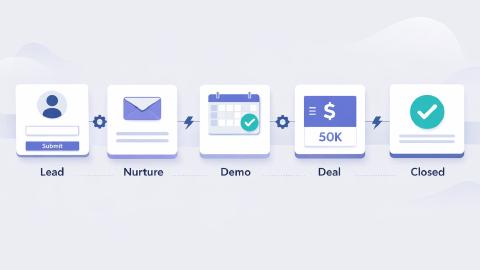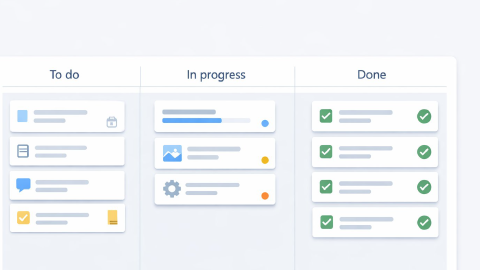10 Best AI Tools for Academic Research in 2026
Use these AI tools to streamline academic research and help you with your research paper in 2026.
Trying to write a research paper when you don’t even know where to start is frustrating. Maybe you're staring at a blank page, drowning in tabs, or stuck figuring out how to cite something correctly.
If research and writing feel like a constant struggle, you’re not alone. The good news is there are tools that can actually help.
An AI research tool can guide you through every step, like finding sources, breaking down complex info, organizing ideas, writing drafts, and checking citations.
In this guide, we'll cover everything you need to know about AI research tools and list out 10 AI tools for academic research you can use to save time in 2026.
What Are AI Research Tools?
AI research tools are apps or websites that help students, professionals, and researchers find, organize, write, and check academic content.
AI research assistants support different types of research like academic research, research papers, legal research, market research, and scientific research. Some can summarize sources, others help write and organize your thoughts, and a few even help you double-check your citations.
Whether you’re in school or doing serious research, they’re designed to save time and reduce frustration. Most tools are easy to use with simple prompts and built-in automation.
What Can AI Research Tools Do?
AI research tools help take the pressure off by handling the hardest and most time-consuming parts of research. Whether you’re writing, reading, or checking your work, these tools can save time and reduce stress.
Here are some things that AI research tools can do for you:
Summarize Articles - Break down long research papers into short, easy-to-read summaries.
Generate Outlines - Build a clear structure for your research paper based on your topic.
Write Drafts - Help write or rewrite sections of your paper using AI writing assistant features.
Find Sources - Locate relevant and credible academic sources for your topic.
Check Grammar and Clarity - Improve how your writing sounds and flows.
Cite Properly - Use an AI citation generator to format your references in APA, MLA, or other styles.
Review for Errors - Scan your work with an AI paper checker or AI grader to catch mistakes.
Explain Complex Ideas - Break down hard-to-understand topics into simpler terms.
These tools for students aren’t just helpful, they’re practical for getting through academic work with less frustration. They make it easier to focus on the thinking part instead of the formatting, searching, or fixing.
Use AI Blaze to answer questions and generate summaries for FREE.
Why Use AI Tools for Research?
Doing academic research and writing takes a lot of time, and it’s easy to get overwhelmed. Using the right AI research tool can make everything feel more manageable from start to finish.
Thinking of using AI tools for research? Here are a few reasons you should give it a try:
Save Time on Research - Quickly find and summarize academic sources without reading every paper.
Write With More Confidence - Get writing suggestions that help with grammar, clarity, and structure.
Stay Organized - Keep track of sources, notes, and outlines all in one place.
Avoid Citation Mistakes - Use an AI citation generator to format references correctly in seconds.
Understand Complex Topics - Break down hard-to-follow studies or articles into simple explanations.
Catch Errors Early - Use an AI checker or AI grader to review your paper before turning it in.
These tools help students focus more on learning and less on getting stuck. Whether you’re starting a paper or finishing one, AI tools for research can guide you through the process.
10 Best AI Tools for Research
There are a lot of tools out there, but not all of them are built to help with academic research and writing.
These ten AI tools for research offer different types of support—whether you need help finding sources, organizing your thoughts, or writing and checking your paper.
Without further ado, here's our list of the 10 best AI tools for research:
AI Blaze
First up on our list of the best AI tools for research is AI Blaze.
AI Blaze is your personal AI research and writing assistant that helps you quickly generate citations, summarize text, articles, and PDFs, and streamline the writing process!
With AI Blaze, you can answer questions and generate summaries on any website (no file uploading necessary)!
Features
Use AI to answer questions - Answer questions and get detailed explanations on any page or website. No need to upload files or copy/paste!
Take notes & generate summaries with AI - AI Blaze helps you summarize PDFs & articles and take notes using AI!
Streamline research with AI - AI Blaze helps you answer questions, improve your writing, check for mistakes, and even generate citations!
AI Blaze works on any website! - Get help with homework on any website on Chrome.
AI Blaze is free! - Forget about annoying licenses or subscriptions. AI Blaze is free for students!
Use AI Blaze to answer questions and generate summaries for FREE.
Unriddle AI (Anara)
Unriddle AI, now called Anara, helps students move from research questions to draft content. It pulls credible sources and builds explanations based on what you’re trying to write about.
Instead of manually searching, it brings the relevant information to you in a conversational format. Sites like Unriddle are designed to simplify the early stages of research and help you get your ideas down faster.
Jenni AI
Jenni AI helps you write academic papers with real-time suggestions and automatic citation support. As you type, it offers sentence completions, rewording options, and citations to match your content.
You can choose how much help you want—whether you're outlining or drafting entire paragraphs. Sites like Jenni AI are pretty useful for keeping your writing on track and aligned with academic standards.
Consensus AI
Consensus AI helps students find research-backed answers quickly by pulling content from peer-reviewed papers. You can ask it a question, and it’ll return summaries based on academic consensus rather than opinions or blogs.
This makes it useful when you need to support your arguments with real studies. It doesn’t help with writing, but it speeds up the research process.
Elicit AI
Elicit is built for doing literature reviews. You give it a research question, and it returns papers along with key details like methods and findings.
This can save time when you need to analyze multiple studies at once. It’s not made for writing, but it helps you get a clear overview of the existing research on your topic.
Scite
Scite focuses on the quality of your sources by showing how papers are cited in other research. It can tell you whether a citation supports or challenges the original study, which helps when you're building arguments.
You can also use it to find related research and track the strength of your references. It’s useful for students who want to go deeper than just collecting links.
SciSpace
SciSpace helps you understand dense academic papers. You upload a file or share a link, and it breaks the content down into plain language.
It also highlights key points and lets you ask questions in a built-in AI chat. Tools like SciSpace are best for students who struggle to follow complex articles and want help reading more efficiently.
Merlin AI
Merlin AI brings AI assistance to any website, including Google Scholar, Docs, and PDFs. It’s not a research-specific tool, but it helps students research, summarize, and write without switching platforms.
You can use it to ask questions, reword content, or organize thoughts while browsing or working on a draft. It’s flexible for multitasking during the research process.
Litmaps
Litmaps helps students visually map out research topics by showing how academic papers are connected. It’s designed to track your reading and help you discover related studies based on what you’ve already explored.
You can build a custom map of sources and revisit them anytime. It’s useful for long-term projects like thesis papers or group assignments that need many references.
Use AI Blaze to answer questions and generate summaries for FREE.
Semantic Scholar
Semantic Scholar is a search engine for academic papers. You can use it to explore topics, find related studies, and check what other researchers have said.
It uses AI to organize results by themes, making it easier to scan for what matters. It’s simple to use and great for building a list of sources to work with.
30 AI Prompts for Research
Getting better results from an AI research tool starts with giving better instructions.
These prompts are designed to help you with common research and writing tasks like summarizing sources, writing drafts, generating citations, organizing ideas, and checking your work.
Use them with any AI tool that supports writing, analysis, or citation support.
Summarize this research paper in 3 clear bullet points using simple language
Write an introduction for a research paper on climate change and its global impact
Generate a structured outline for a paper about the effects of social media on student focus
Suggest five credible academic sources about the benefits of online learning
Compare the findings from these two articles and explain the key differences
Turn these notes into a well-organized research paragraph with citations
Reword this paragraph to sound more formal and academic
Explain the research methods used in this study and why they were chosen
Write a conclusion paragraph that summarizes the main findings from this research
List and explain three counterarguments to the idea that technology improves education
Find three recent peer-reviewed studies on the impact of sleep on memory
Break down this dense academic paper into a simple explanation anyone can understand
Turn these bullet points into a full paragraph with smooth transitions
Help me create a thesis statement about the rise of electric vehicles
Rewrite this sentence to improve clarity and remove passive voice
Generate citations in APA style for these sources: article titles and author names provided
Identify the research gap in this paper and suggest areas for future study
Help me write a literature review on remote work and productivity
What are three common misconceptions about artificial intelligence in education?
Add proper citations to this paragraph based on these source links
Write a background section for a research paper on fast fashion and sustainability
Explain what the results section of this study means in simple terms
Suggest three follow-up questions I could research based on this topic
Find supporting evidence from academic sources for this claim about climate policy
Help organize these ideas into a logical research paper structure
Format a works cited page in MLA style for these five sources
Review this paragraph for grammar issues and sentence structure problems
List three strengths and weaknesses in this research paper's argument
What is the significance of this study’s findings for future research?
Generate five possible research questions related to environmental economics
These prompts can help you get more out of any AI research tool, whether you're brainstorming, writing, or reviewing.
Make Research Less Overwhelming
AI tools for research can help simplify everything from reading articles to writing and checking your final paper.
Whether you need an AI writing assistant, an AI citation generator, or an AI paper checker, there’s a tool that can take some pressure off. Try one or two and see what fits your workflow best.
To recap, our suggestion for the best AI tool for research is AI Blaze. AI Blaze is your personal AI research and writing assistant that helps you answer questions, improve your writing, generate citations, and much more. Plus, AI Blaze is free for students and works on any website!




